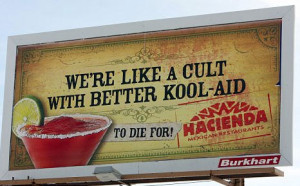The expression “drinking the Kool-Aid” is now deeply embedded into American slang. While its origins are painfully understood by most of the people who visit this site, it’s also true that no one knows when or in what context it first entered our slang lexicon. As time passes, two other characteristics of slang will occur: its earliest meaning will morph into a multitude of derivatives – indeed, that has already begun to happen – and fewer and fewer people who use it will know where it came from. If there is a recent shift in its usage, it is that the anonymity of the blogosphere seemingly encourages often uncivil – if not viciously angry – discourse, and many writers have increasingly adopted the phrase as a weapon of attack against those who dare to disagree with them.
 • The most public conversation of the phrase in recent years came in February, in response to a decision by Hacienda Mexican Restaurants near South Bend, Indiana to erect a billboard promoting itself as a cult with better Kool-Aid (see story here).
• The most public conversation of the phrase in recent years came in February, in response to a decision by Hacienda Mexican Restaurants near South Bend, Indiana to erect a billboard promoting itself as a cult with better Kool-Aid (see story here).
Several other stories on the Hacienda’s Kool-Aid billboards appeared in both national and local media. They include:
• “Eatery pulls billboard ads using Jonestown ‘cult’ reference,” USA Today, Feb 22, 2011
• “Hacienda’s Jonestown billboard snuffed out,” AdWeek, Feb 22, 2011
• “Indiana Restaurant Pulls Billboards With Jonestown Massacre References,” Huffington Post, Feb 21, 2011.
• “‘To die for’: Hacienda restaurant chain pulls offensive billboard ads making fun of horrific Jonestown massacre,” The Daily Mail, Feb 21, 2011
• “Ind. eatery pulls billboards with cult references,” The Columbus Dispatch, Feb 21, 2011
Commentary about the Kool-Aid billboard included:
“Restaurant Billboard Harkens Jonestown Mass Suicide,” Adrants, Feb 15 2011.
A dissenting opinion about the controversy itself appeared as “Obituary: Humanity’s Sense Of Humor” in The Agnostic Library.
• A new book, Don’t Let the Kids Drink the Kool-Aid by Marybeth Hicks, claims that the American political left has hijacked the national education system and is rewriting history to make it “politically correct.” The result is that school children are being brainwashed, just as Jim Jones’ followers in Guyana were. The book has received several glowing reviews from bloggers and websites on the right – including Human Events, Rebecca Hagelin’s postings in The Patriot Post and The Washington Times – and negative assessments from the left, like The Huntington News.
This listing presents other recent efforts by writers or bloggers to consider the context of the phrase itself, to explain its origin, or to argue for the care people should take in using it.